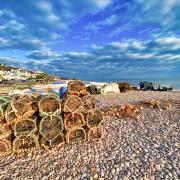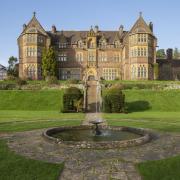JOHN WRIGHT traces the at times unbelievable history of those early criminals from Devon sent to Australia as punishment
Devon provided its share of 136,000 men and 25,000 women transported to Australia in the 80 years after 1788, some of whom landed on their feet, if not Jane Meech and Benjamin Smith, who were charged at the Devon Lent Assizes in Exeter with stealing “four iron chains” and probably hoped they wouldn’t spend seven years wearing them.

Richard Wall, Matthias Jewell and William Hackaday attacked Richard Honey and “robbed him of two pistols and a sabre” in Exeter in 1802, and 28-year-old Charles Granger was tried in Plymouth in 1786 for “a petit larceny in feloniously stealing one quilt and two sheets, the property of Samuel Skelton on which he was arraigned.”
Steal £1’s worth of property in this desperate era and you could hang – the sentence often transmuted to transportation so offenders felt better about seasickness on a creaking sailing ship for eight months, as endured by the 11 ships of the First Fleet in 1787.

Plymouth highway robber John Herbert enjoyed this roller-coaster ride, transported for stealing “a watch, pruning fork and five shillings from an innkeeper,” Mollie Gillen wrote in The Founders of Australia...arriving at Sydney Cove in January 1788 he married Deborah Ellam who, eight months later, received “25 lashes for accusing him of beating her without cause. She was ordered to return to him.”
Settling on Prospect Hill, Herbert became prosperous from farming, leaving his 70 acres to his eight children and “several houses in Campbell St, Parramatta, Sydney to his second wife, Ann Dudley.” In 1827 he “was fined ten shillings for driving a cart with two horses furiously through the town.” He died in his late eighties and was buried next to his first wife’s grave, his epitaph being: “If I had faults, who is without?”

A then 21-year-old Ann Mash was tried at the March 1789 Devon Assizes at Exeter Castle for stealing a bushel of wheat and was transported in the Second Fleet on the Lady Juliana whose ship surgeon, Richard Alley, according to Michael Flynn in The Second Fleet: Britain’s Grim Convict Armada of 1790, “demonstrated a genuine concern for the female convicts and supported the women’s request that tea and sugar be included in their ration.” It also led to Alley fathering Mash’s child Charlotte who was born before they arrived in Port Jackson (Sydney) in June 1790.
Serious offenders in Van Diemen’s Land (Tasmania) were sent to the infamous Port Arthur Penitentiary on the island’s south eastern peninsula, separated from its mainland by a narrow neck of land guarded by vicious dogs. John Glanville was convicted at the Devon Quarter Sessions in Exeter in 1841 for stealing a shilling from a boy prisoner. Transported on the Susan, Phillip Hilton and Susan Hood wrote in Caught in the Act: Unusual Offences of Port Arthur Convicts, he was sent to Port Arthur where the authorities dreamt up ridiculous ‘crimes’, Glanville committing 55 offences over ten years, including “having turnips improperly”.

Offences 19-year-old Plymouth-born shoemaker William Yeomans committed at Port Arthur hardly made him ‘Mr Big’ either. Transported for seven years for stealing lead and tried in Salop [Shropshire] in 1829, he arrived in Tasmania on the Bussorah Merchant to spend an astonishing 47 years at Port Arthur. In 1832 “whilst working for Public Works, Yeomans received 30 lashes for, ‘refusing to work on the plea of being badly shod and cutting his shoes to afford an excuse for not working.’”

In 1835 his terrible crime was “having a pair of leather braces in his possession privately made contrary to regulations.” Instead of allowing this skilled tradesman to train others and shoe the whole colony, he was put in a chain gang for three months. For being a post messenger in 1838 and “obtaining breakfast at the Swan Hotel at Bagdad without having means to pay,” he got 12 months hard labour (six in chains).
Most famous of Port Arthur convicts was George ‘Billy’ Hunt, transported for stealing a handkerchief. His crime was “absconding”; nothing unusual about that, except that Billy was “dressed as a kangaroo at the time and was attempting to hop to freedom, only to be shot at by rationed soldiers, who had grown accustomed to hearty kangaroo stews.”

Good luck story
Ex-lieutenant William Thomas Stocker from Broadcliff was transported on HMS Calcutta in 1803 for forging money. His wife Ann followed but died on the way, whilst Stocker “was appointed by Lieutenant-Governor Collins as captain of the night watch” in Hobart, wrote J.H. Walker in Early Tasmania, and was Derwent Hotel licensee, “the best inn in the town.”
In 1816 Stocker married publican Mary Hayes and ran a cartage service that was often attacked by bushrangers. Receiving “one of the earliest pardons,” wrote Marjorie Tipping in Convicts Unbound “by 1819 he had bought 555 acres of land and a lot of livestock, built a butcher’s shop and renovated her pub with his wife’s money,” respectability assured when allotted a pew in Hobart’s St David’s Cathedral.

Curious crimes at Port Arthur Penitentiary
One convict was reprimanded for “washing his shirt during Divine Service”, another for “baking light bread.” Here is a random list of various other offences (and these aren’t all Devon convicts!): “feloniously, wilfully and diabolically interfering with a dog...having lollipops in his possession…setting fire to his bedding…drawing improper figures on his slate…threatening to split the overseer’s skull with his spade…gross filthiness within the barrack square…wilfully breaking his wooden leg…apprehending Godfrey Moore and biting his nose off…groaning at the Lieutenant Governor when he entered Government House” (eight months hard labour in chains for that one). And one woman got two months in the Female House of Correction for “concealing a man under her bed.”





























